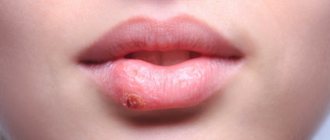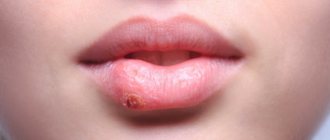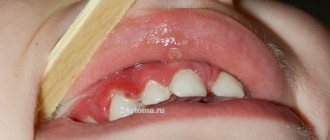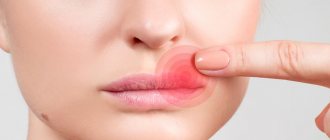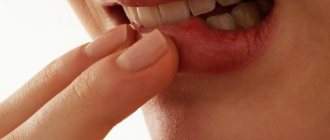Herpes on the lips (herpes labialis) is one of the most common infectious diseases. People call herpes on the lips “cold sores” or “fever”. Cold sores are a very well-known disease. The first description of the symptoms of a “cold on the lips” was made by the Roman physician Herodotus in the 5th century BC. Chronic herpetic infection is an immunodeficiency disease with lifelong persistence of the virus in the cells of the nerve ganglia with dysfunction of both the autonomic and central nervous system, characterized by periodic exacerbations with the appearance of clinical signs (“hypertic vesicles”), localized in places that are constant for each patient - “Locus minoris” . Herpetic blisters affect the mucous membranes of the urethra, vagina, cervix, as well as the mucous membranes of the mouth, eyes, lips, genitals, skin, and when the process generalizes, the liver, brain and other organs. Herpes on the lips, although it is a disease of the body as a whole, usually gives external manifestations on the lips, less often on the nasolabial triangle (on the lips and on the wings of the nose).
Herpes on the lips is characterized by the ability to recur. Some people regard herpes on the lips as an unpleasant inevitability or a cosmetic defect, others, who experience frequent relapses of the disease, as a serious disease that can not only disrupt life plans, but also significantly reduce the quality of life and lead to depression. Most patients who have repeatedly suffered relapses of herpes on the lips wait with fear for the next relapse.
Fact About 20% of the Russian population is susceptible to herpes on the lips
So, after all, the appearance of herpes on the lips: an unpleasant inevitability or a disease worth fighting? Let's figure it out together.
The causative agent of herpes on the lips in 76% of cases is herpes simplex virus type 1 (HSV-1). There are cases of herpes on the lips caused by HSV type 2. HSV-1 and HSV-2 are close relatives and have a number of common biological properties, including the ability to persist for life in the human body. This means that after the initial infection, the virus is not completely removed from the body. Can you get cold sores or herpes labialis? Yes, sure. After all, a “cold on the lips,” being a viral disease, is very contagious. Therefore, sick people and those around them must take the necessary precautions. Patients should not only treat colds on the lips with modern, effective means, but also strictly observe all safety measures during the period of exacerbation, so as not to infect loved ones, children, and colleagues.
How is herpes on the lips transmitted?
Herpes on the lips occurs due to human infection with the herpes simplex virus.
Methods of infection:
- airborne route. In 40% of patients, primary infection with HSV occurs in early childhood, and the source of infection, as a rule, is family members with obvious signs of herpes virus infection.
- contact - household transmission of the virus through contaminated objects: dishes, cutlery, towels, toys, etc.,
- when kissing, in close physical contact with a sick person or a virus carrier,
- during oral, oral-genital, oral-anal contacts,
- after transfusion of blood and its components (hemotransfusion route),
- after organ and tissue transplantation (transplantation route),
- vertical transmission from an infected mother to the fetus during pregnancy, infection of a newborn in the presence of herpetic manifestations in the mother and medical staff, when infected equipment is used to care for newborns.
For a cold on the lips
- Do not touch the area or apply antiviral ointments with your hands where the rash is located. If you do touch them, wash your hands thoroughly with soap and use cotton swabs.
- Do not comb, squeeze, open blisters, or tear off crusts. This can cause the infection to spread to nearby skin or fingers.
- Do not apply medicinal, antiviral agents, or antiseptics to lesions (rash elements) with your hands.
- You should only have your own separate dishes, personal hygiene items, and cosmetics.
- You should refrain from kissing, oral, orogenital contact.
- Even when using barrier contraception during orogenital intercourse, remember that they reduce the risk of infection, but cannot protect 100% from infection.
Classification of herpes on the lips
Depending on the mechanism of infection, acquired and congenital infections are distinguished. Acquired infection is divided into primary and recurrent.
How to stop a cold on the lip at the initial stage
Herpes is easy to get infected even on the street and the virus progresses quite quickly when it enters the body, developing in a matter of hours. With surgical treatment, a mild course of the disease and short-term recovery can be achieved.
The herpes labialis virus can be stopped if signs of the disease are detected at the initial stage.
If the following alarming symptoms appear:
- Tingling and burning
- Redness around the lips
- Pain around the mouth and larynx
- Temperature and itching on the lip
Treatment for herpes should be started immediately. These signs indicate the onset of the disease and at this stage it is possible to prevent herpes.
The patient has approximately two days for treatment before the next symptom appears - transparent blisters, which indicates the transition of the disease to a more severe stage.
Treatment should also be started if there has been contact with a carrier of the virus.
To treat labial herpes at the initial stage, antiviral drugs should be used. Today there are a large number of ointments and tablets against colds on the lip that are available without a prescription.
Antiviral drugs slow the progression of the disease, relieve symptoms and alleviate the patient's condition.
Herpes on the lips, symptoms
Herpes on the lips is clinically manifested by the following symptoms. 1-2 days before the appearance of the rash, the first symptoms of herpes on the lips are subjective sensations in the form of pain, burning, itching, tingling, discomfort in areas of the mucous membranes and skin. There may be symptoms of general intoxication (increased body temperature to 38°C and above , chills, malaise, headache, sleep disturbance). Then small bubbles appear filled with clear liquid against a background of swelling. After 2-4 days, the blisters burst, forming ulcers, then crusts. Unstable pigmentation may remain.
The appearance of blisters in the same place is a distinctive feature of the herpes virus on the lips and all other forms of herpes virus infection “locus minoris”.
How does herpes on the lips manifest in primary and recurrent forms of the disease?
Primary herpes of the lips develops after infection of a previously uninfected person with the virus; in 80-90% of infected people it is asymptomatic, in 10-20% it manifests with clinical symptoms.
The first signs of herpes on the lips may occur after contact with an infected person after a 1-10 day incubation period. Then, on the mucous membranes or on the red border of the lips or adjacent areas of the skin, edematous erythema appears, against which small, grouped (less often merging) blisters filled with clear liquid appear. After 2-4 days, the blisters burst, forming weeping erosions, less often ulcers, healing under a crust or without its formation.
After complete regression of the rash, a slightly pigmented spot remains in its place for some time. Subjective sensations may persist even after the bubbles resolve. In some weakened patients, in young children, along with rashes in the lip area, there may be rashes of other localization, enlarged lymph nodes.
Exacerbation of herpes on the lips occurs against the background of decreased activity of the immune system.
The duration of the acute period for primary herpes on the lips is 10-20 days; in the case of a secondary bacterial infection, it increases to 3-5 weeks.
After this, the disease goes into remission. This means that after the initial infection, the virus remains in the body, accumulating in the sensory ganglia of the cranial ganglia and persisting in them for life. The duration of remission depends on a number of reasons, the main one of which is the state of immunity. Under the influence of provoking factors, the virus can become active at any time and enter the relapse stage.
Types of herpes simplex virus and their features
If we talk about such a manifestation of herpes as a “cold” on the lips, then it is caused by the first two types of virus: HSV-1 and HSV-2. They are very contagious and contribute to the appearance of small bubbles - vesicles - on the mucous membranes. The favorite site of manifestation of HSV-1 is the oral cavity, and HSV-2 usually affects areas in the genital area.
Herpes disease does not always appear only on the lips or genitals. Other areas of the body may also be affected: fingertips, cornea, skin, internal organs and systems, even the spinal cord and brain.
How does recurrent herpes on the lips manifest?
Recurrent herpes on the lips is recorded in 50-70% of patients who previously suffered from an asymptomatic or clinically pronounced primary form of the disease. Relapse is the repeated appearance of typical rashes in the same place - at the site of primary infection (“Locus minoris”).
Fact The state of immunity determines the likelihood of development and severity of the disease, the frequency of subsequent relapses of herpes on the lips.
Factors contributing to the development of relapse are:
- hypothermia, overheating, hyperinsolation (including in a solarium),
- neuro-emotional stress,
- medical and cosmetic procedures (tattoo), surgical operations,
- somatic, endocrine, oncological, infectious diseases (frequent ARVI),
- hormonal changes
- decreased immunity, primary or acquired (secondary),
- poor nutrition,
- long-term use of medications (hormones, chemotherapy, antibiotics, including antivirals, cytostatics),
- active sexual life (for example, with frequent changes of sexual partners or orogenital contacts).
Herpes on the lips manifests itself symptomatically during relapses. Relapse of the disease occurs against the background of circulating antiviral antibodies and therefore proceeds more easily compared to primary herpes. Subjective sensations and intoxication may be mild or absent altogether.
Fact The clinical picture of recurrent herpes on the lips resembles that of primary herpes.
The duration of relapse is less than the duration of primary herpes on the lips and is 7–10 days.
It should be noted that along with the typical manifestation, herpes on the lips can be asymptomatic, with symptoms that go unnoticed, as well as atypical or abortive.
Atypical forms of herpes on the lips may be caused by a change in the development cycle of herpetic elements in the lesion. In atypical forms of recurrent herpes on the lips, as a rule, one of the stages of development of the process in the lesion (erythema, formation of single or multiple blisters) or one of the components of inflammation (swelling, hemorrhage, necrosis) or subjective symptoms (itching) predominates. For example, the edematous form of herpes on the lips differs from the typical form by a sharp swelling of the subcutaneous tissue and hyperemia of the skin (usually on the lips); vesicles may be completely absent.
The hemorrhagic form of herpes on the lips is characterized by the appearance of blisters not with transparent, but hemorrhagic contents, and the subsequent development of ulcerations.
The abortive form of herpes on the lips occurs in patients who have previously received antiviral treatment and/or vaccine therapy. The lesion in an abortive course goes past some of the stages characteristic of the typical form and may appear as an itchy spot or papule.
The subclinical form of recurrent herpes on the lips is detected during a virological examination of sexual partners with any sexually transmitted disease, or during an examination of married couples. Symptoms in this form are mild or completely absent. Patients with a subclinical form of herpes on the lips are a source of infection for their loved ones, children, and sexual partners.
How does herpes simplex develop?
- It all starts with itching and/or tingling in the place where herpes develops - as we have already found out, most often this is the area of the nasolabial triangle. The skin turns red and begins to itch.
- Next, the stage of inflammation begins. Swelling appears in the affected area and a small, painful pimple appears - a blister containing clear liquid. Over time, this liquid becomes cloudy. A small pimple(s) gradually increases in size.
- The blisters burst 3–5 days after the onset of the disease. A liquid flows from them, containing an uncountable number of viral particles. During this period, contact with a sick person should be stopped, since the risk of infection is very high. At the site of the rash, ulcers with a purulent crust (scabs) form. When the scab is damaged, bleeding begins.
A natural question for every patient is, how many days does it take for herpes to go away? This usually takes about 10 days. If symptoms do not disappear during this time, you should see a doctor, since herpes can signal the presence of other diseases.
Herpes ointment
How often can herpes on the lips reactivate?
Relapses with type 1 HSV infection occur earlier and more often than with type 2 HSV infection. Lip herpes in 25% of adults has regular relapses 1–2 times a year, and in 5–10% of adults there can be up to six relapses per year. Relapses of the disease can occur with varying frequencies. The appearance of herpetic lesions no more than 4 times a year is regarded as a favorable prognostic sign, especially if the rashes appear in the same place and are moderately expressed. Relapses that occur more often than once every 3 months, monthly or every 2 weeks indicate a significant defect in the immune system, which requires additional examination of the patient. In some patients, a continuous course of the disease is possible, when old elements have not yet resolved, but new ones are already appearing.
The frequency of recurrence of herpes on the lips in men and women is the same.
Persistent herpes on the lips (often recurrent) leads to the development of secondary immunodeficiency, manifested in frequent colds, disruption of general condition, decreased performance, the appearance of low-grade body temperature, lymphadenopathy, and psychoasthenia. Often recurrent herpes on the lips is often the cause of neuropsychiatric disorders.
Recurrent herpes on the lips is accompanied by the risk of:
- Infection of children, sexual partners, others;
- Infection of other areas (eyes, genitals, mucous membranes);
- Long-term persistence of symptoms (up to several months) in persons with reduced immunity;
- The appearance of several lesions;
- Attachment of a secondary bacterial infection.
Is it possible to permanently get rid of the herpes virus in the body?
It is impossible to get rid of the herpes virus forever. It penetrates the body and remains with the patient for the rest of his life. The virus lives in nerve cells and the spinal cord, but may not cause any disorders or complications in life.
One way or another, 90 percent of the entire population of the planet are carriers of the herpes virus. At the moment, there are a large number of drugs that can stop the DNA of the virus.
But at the same time, a remedy that allows you to get rid of herpes forever has not yet been invented.
Herpes on the lips. Diagnostics
If typical symptoms are present, the diagnosis is made based on clinical data; laboratory confirmation is not required.
Laboratory confirmation is required in the following cases:
- when establishing the etiology of the disease in asymptomatic and chronic relapsing course,
- when establishing the etiology of the disease during dissemination of the process,
- when uncharacteristic rashes or atypical localization of rashes appear,
- when establishing the etiology of the infectious process in HIV-infected persons or persons with secondary immunodeficiencies of various origins.
In the above cases, the diagnosis must be established based on a combination of anamnestic, epidemiological, clinical data and laboratory research methods. The specificity of the patient’s rash is confirmed by laboratory methods: either by isolating the virus in cell culture (“gold standard” of diagnosis); or by identifying virus antigens; or by determining viral DNA in discharge from the lesion, in biological materials from the patient using polymerase chain reaction (PCR). To do this, material is taken directly from areas of rashes suspected of herpes. The state of humoral immunity in a patient is assessed by identifying specific antibodies of the IgG and IgM classes to HSV-2/-1 in the blood serum (for this diagnosis it is necessary to donate blood from a vein) using the enzyme-linked immunosorbent assay (ELISA). Detection of IgM and IgG antibodies to HSV determines the duration and severity of the disease and answers the question: is a person infected with HSV?
If you have herpes on your lips, what should you do?
Consult a doctor (infectious disease specialist, dermatologist-venereologist) for advice.
Self-medication is not acceptable!
If your herpes on the lips does not go away, often recurs, and is accompanied by complications, what should you do?
It is recommended to consult a doctor for advice; confirm the specificity of rashes on the lips using laboratory methods, examine the intensity of antiherpetic immunity, the state of the immune status, and sensitivity to antiviral drugs.
Discuss on the forum
Features of the course of genital herpes during pregnancy
The number of positive (seropositive) reactions to herpes viruses 1 and 2 in pregnant women is 50-70%. Due to the increased load on the body and decreased immune defense, herpes often relapses during this period. But only 30% of women experience the classic development of the disease. Basically, the symptoms of herpes during pregnancy are limited to the appearance of areas of redness and cracks, which women mistake for irritation.
The manifestation of a herpetic infection caused by recurrence is not dangerous for the child. The woman’s body has already built up immunity to infection by producing antibodies—substances that protect her from the virus. Some of the antibodies will pass from mother to baby, protecting him from infection.
Only a relapse that occurs immediately before childbirth is dangerous. To prevent infection of the baby and rupture of inflamed tissues, women with a herpetic rash on the genitals are advised to deliver by cesarean section.
It is much worse when the infection is primary. Herpes belongs to a group of infections, infection of which for the first time during pregnancy leads to the birth of children suffering from developmental delays and congenital defects.
Herpes tests for pregnant women: interpretation and prognosis of pathologies in the fetus
To determine the degree of risk for the baby, a woman’s blood is taken for IgM and IgG antibodies, the concentration of which determines when infection occurred. The analysis is carried out using the ELISA method (immunofluorescence), which reacts to IgM and IgG antibodies to the virus. By the presence or absence of antibodies, you can find out whether a woman is infected and when the infection occurred:
- IgM antibodies
appear after 2-3 weeks. after the onset of the disease, therefore indicating a “fresh” infection or relapse of infection. These antibodies disappear after 1-2 months. after recovery. The presence of IgM in the analysis is a bad sign. - IgG class antibodies
- appear as protection against the virus after 2 weeks. field of infection, quickly increase the titer (concentration) and persist throughout life. Their detection means that the body encountered a herpes infection and managed to cope with it.
It is bad if a fourfold increase in IgG is combined with the detection of IgM. This means that antibodies are being formed right now, i.e. the woman is sick.
Infection with the herpes virus is determined in the laboratory. It is better to undergo such an examination twice - before pregnancy and during it.
Table of interpretation of results for herpes
| IgM | IgG | What does it mean | What to do | |
| — | — | The woman is healthy (seronegative) - she has never had herpes | Before pregnancy | During pregnancy |
| In order not to become infected, you need to avoid contact with people who have manifestations of herpes, incl. on the lips. Periodic antibody monitoring is recommended | ||||
| — | + | Female carrier (seropositive) | The infection occurred a long time ago and does not pose a danger to the child, no measures are needed | |
| + | — | Recent infection | It is better to plan pregnancy after acute symptoms subside and re-examination | Consult a doctor and undergo additional diagnostics to find out if everything is okay with the baby. |
| + | + | Exacerbation of infection | It is better to plan pregnancy after acute symptoms subside | Recurrent herpes is less dangerous than primary herpes, so the likelihood of complications and intrauterine infection is only 0.02% |
Fetal pathologies in children infected with herpes during pregnancy
The most dangerous thing for a child is primary infection of the mother during pregnancy, which leads to many complications.
| Gestational age at primary infection | Possible complications |
| I trimester (up to 13 weeks) | Fading pregnancy, miscarriages, severe malformations |
| II trimester (14-27 weeks) | Child infection, internal organ defects, fetal death |
| III trimester (29-40 weeks) | Intrauterine infection, death of a child after birth, premature birth, hearing, vision, and nervous system defects of the child. Subsequently - mental retardation. |
How to treat herpes on the lips?
How to cure herpes on the lips? How to get rid of cold lips? It should also be noted that currently there are no drugs for herpes that can remove the virus from the human body and lead to a complete cure. Therefore, treatment of colds on the lips is aimed at suppressing the virus in the body and, most importantly, restoring the immune system.
Each case of primary or recurrent herpes on the lips requires mandatory treatment in order to:
- prevent complications
- prevent relapse of the disease,
- to prevent transmission of the virus and infection of children, loved ones, sexual partners, work colleagues, etc.,
- prevent a decrease in quality of life,
- prevent further weakening of immunity.
Drug treatment comes down to 3 stages:
- suppressing an outbreak or relapse of the disease with the help of antiviral (chemo) drugs, interferons;
- restoration of the body's defenses - immunity with the help of general strengthening agents, probiotics, vitamins, interferons;
- vaccination with the antiherpetic vaccine "Vitagerpavak".
How to treat herpes on the lips?
Effective antiviral chemotherapy drugs for herpes on the lips are drugs such as acyclovir, as well as its more effective second-generation derivatives: valacyclovir, Valtrex, famciclovir, penciclovir. These drugs have a comparable mechanism of action and clinical effectiveness, they help to quickly and effectively reduce the severity of symptoms, subjective sensations, and the duration of relapse, but they cannot cure the infection (completely remove the virus from the body).
Acyclovir and its analogues act only on the active herpes virus, but do not affect viruses that are in a latent state. A common disadvantage of acyclovir-containing drugs is the inability to prevent relapses of the disease and infection with a related type of virus and a negative effect on the immune system. Further suppression of the immune system leads to the emergence of resistant strains of the virus. Antiviral chemotherapy drugs are used occasionally in a short course (5-10 days) for primary herpes or for relapses of herpes.
For herpes, it is possible to use antiviral agents topically. This helps lead to a significant reduction in the time of appearance and regression of rashes due to the high bioavailability of active substances at the site of the lesion. Acyclovir (ointment, cream) and the new drug Penciclovir (1% cream Fenistil® Pencivir) have proven themselves well. The effectiveness of Fenistil® Pentsivir is 20–30% higher than acyclovir-based cream. Fenistil® Pencivir cream can be used in patients over 12 years of age. If there is resistance to acyclovir-containing drugs, antiviral drugs with a different mechanism of action (foscarnet, isoprinosine, panavir, aloferon, etc.) are used.
During pregnancy, in order to treat and prevent the recurrence of herpes on the lips and infection of the fetus, herpes medications in tablets (Acyclovir, tablets) are prescribed starting from the second trimester of pregnancy in consultation with the doctor.
The presence of side effects from the use of chemotherapy drugs contributed to the introduction of modern, effective and harmless drugs - interferon drugs - into the treatment of herpes. The ability of interferons to suppress the multiplication of a virus in the human body explains the need for their use (giaferon, viferon, genferon, etc.). The effectiveness of Giaferon is 30% higher than the effectiveness of other drugs in this group, because also contains hyaluronic acid, an independent immunomodulator. Their use as antiviral agents and immunomodulators, stopping relapses of the disease and correcting immunity, allows them to be effectively used in the treatment of pregnant women and nursing mothers, and to prevent intrauterine infection of the fetus.
How to quickly cure herpes on the lips?
If treatment using interferons and chemotherapy drugs in tablet form or for external use (ointment) is started at the first signs of the disease - during the period of precursors of relapse (itching, burning) or in the first 2-3 days of relapse, then the symptoms of herpes will be mild or may not appear completely.
Is it necessary to talk about the importance of treatment aimed at strengthening the defenses and preventing the recurrence of herpes on the lips? In cases of moderate and severe forms of the disease (relapse once every 3 months or more often), to increase the effectiveness of treatment, treatment regimens, along with antiviral drugs, include immunocorrective drugs: immunomodulators, interferons, vitamins, restoratives, immunoglobulins and probiotics. It should be noted that immunotherapy leads to deep remission, i.e. to restore immunity, allows you to shorten the duration of treatment, reduce the toxic effect of chemotherapy drugs on the body, prevent the formation of resistance to them and lead to deep remission, i.e. to restore immunity.
To increase the effectiveness of treatment of herpes virus infection, a group of virologists and infectious disease specialists led by Doctor of Medical Sciences, Prof. V.A. Isakov* developed a step-by-step, comprehensive method for treating and preventing recurrence of the disease using the drugs described above:
- Stage 1 of treatment – relief of the acute period of the disease (chemotherapy, interferons),
- Stage 2 – restorative therapy, immunocorrection,
- Stage 3 – specific immunoprophylaxis – vaccination with the antiherpetic vaccine Vitagerpavak,
- Stage 4 – clinical observation.
Chemotherapy drugs and interferons only suppress the virus in its active stage, but the vaccine treats, normalizing immune defense, and therefore belongs to the group of therapeutic vaccines.
It should be noted that special attention is paid to restoring the body’s immunological reactivity with the help of medication and anti-relapse treatment using general tonic agents, vitamins, interferons, probiotics, and immunoglabulins. Immunoprophylaxis at the final stage of treatment with the antiherpetic vaccine Vitagerpavak allows you to restore specific antiviral immunity, i.e. achieve suppression of the virus and normalization of immunity, leading to long-term (many years) remissions. This technique was called the “Russian method of treatment” in the West.
It is important to remember and consider that:
- Herpetic infections are a consequence of impaired immunity.
- In mild forms of the disease (exacerbation no more than once every 3 months), there is slight immunosuppression. Therefore, vaccination can be carried out immediately, without restorative treatment (7-10 days after healing of herpetic eruptions with an interval of 7-10 days, in the amount of 5 injections).
- In moderate and severe forms of the disease (recurrence once every 3 months or more often), it is necessary to eliminate severe immunosuppression by prescribing general tonic drugs, vitamins, immunomodulators, probiotics, and only then begin vaccination (10 days after healing of the rash with an interval of 10 days in the amount of 5 injections). It is necessary to carry out 4 courses of vaccination with an interval of 3 months under the cover of Giaferon (1 suppository 2 times a day rectally - 5 days).
The effectiveness of treatment is more than 86%, which is confirmed by the results of its use for 12 years and numerous studies of effectiveness conducted by leading scientists and clinicians of the Russian Federation in various fields.
The Vitagerpavak vaccine is used during the period of remission of the disease. The purpose of vaccination is to activate cellular immunity, i.e. its immunocorrection.
The use of the Vitagerpavac vaccine has a number of advantages over antiherpetic drugs, as evidenced by studies conducted in leading medical institutions in Russia.
Prof. N.S. Potekaev** and Associate Professor M.A. Samgin (Department of Skin and Venereal Diseases of the I.M. Sechenov First Moscow State Medical University) studied the effectiveness of the Vitagerpavak vaccine in 233 patients with recurrent herpes, including herpes on the lips . The treatment was the Vitagerpavac vaccine. It was shown that regular vaccination led to an increase in the period of remission to 1-3 years. Over time, 5 years after regular 4-year vaccination, 88 patients were examined: a positive effect was noted in 72% of patients with a recurrent form of herpes; complete cure - in 42 patients, significant improvement - in 24 patients.
In another study, the vaccine was studied in 3,000 patients with frequently recurrent forms of herpesvirus. Dynamic observation of patients over a period of 3 to 5 years showed that vaccine therapy led to a complete cessation of disease relapses in 1890 patients (63%), to a decrease in the frequency of relapses in 810 people. (27%). The lack of effect was detected in 240 (8%) patients (MD, professor, head of the department of skin and venereal diseases of the RUDN University, A.L. Tishchenko).
In a study conducted by Prof. Barinsky I.F. et al., **** at the Federal State Budgetary Institution “Research Institute of Virology named after. DI. Ivanovsky" of the Ministry of Health of Russia, Moscow, it was shown that in patients with frequently recurrent herpes, including herpes on the lips, 6 months after vaccine therapy (Vitagerpavak) a significant improvement (increase in the inter-relapse period by 3 times) was noted in 19 (31.1%) patients, improvement (increase in remission by 1.5–2 times) - in 35 patients (57.3%) and only in 7 (11.6%) patients the therapeutic effect was weak or absent. As a result of vaccination, the majority of patients (38 people) stopped treatment due to improvement. In 52% (20 patients) of them, clinical symptoms of recurrent herpes were completely absent.
Prof. Barinsky I.F. et al.,*** also conducted a comparative study of the effectiveness of the vaccine alone and in combination with the immunostimulant Giaferon in patients with frequently recurrent herpes, including herpes on the lips. The means of treating herpes were: the polyvaccine Vitagerpavak and the immunostimulant Giaferon. Patients of group 1 (28 people) were prescribed the Vitagerpavac polyvaccine in combination with an immunostimulant. Patients of group 2 (25 people) received only the vaccine. Efficacy was assessed by reducing the duration and intensity of clinical manifestations of genital herpes during relapse and increasing the duration of the interval between relapses. When using the vaccine in combination with Giaferon, a positive result was noted in more than 96% of cases, when using one vaccine - in 84% of cases. The conducted studies demonstrated the advantage of the combined method of vaccine therapy and the immunostimulant “Giaferon”. The proposed combined treatment regimen made it possible to prevent relapses of herpes, including herpes on the lips.
Dynamics of clinical parameters in patients with recurrent HH during vaccine therapy
| Clinical indicators | Before vaccine therapy | After vaccine therapy |
| Duration of remission | 2 months | 6 months in 36 (59.0%) patients |
| Relapse rate | 5–10 times a year | 2–3 times a year |
| Duration of relapse | 3–8 days | 2–3 days |
Of interest are the results of a study using the Vitagerpavac vaccine conducted by Prof. A.A. Kasparova et al. (Research Institute of Eye Diseases of the Russian Academy of Medical Sciences), with the participation of patients with ophthalmoherpes caused by the herpes simplex virus. Of 114 patients with ophthalmoherpes with frequently recurrent forms, relapses of the disease completely stopped in 71 patients (63%), their frequency became significantly less frequent in 32 (27%) and did not change in only 11 people. (10 %). Analysis of the results revealed a 5-fold reduction in the frequency of relapses and a 3.2-fold reduction in the duration of relapses per 1 patient suffering from herpetic keratitis, keratoiridocyclitis and iridocyclitis. When studying the blood of patients with herpes using PCR and MFA methods, it was revealed that the use of an inactivated vaccine was accompanied by the elimination of viremia.
In the above-mentioned studies, it was also shown that vaccination was accompanied by a 3-4 times increase in specific reactions of T-cell immunity, against the background of a constant level of B-cell immunity reactions. The study of T-cell immunity reactions showed an increase in the specific T-killer activity of lymphocytes and the activity of NK cells. Vaccination contributed to the cessation of viremia both after the end of vaccination and in long-term follow-up (after 6 months). Vaccination using Vitagerpavak led to a pronounced immunocorrective effect, reducing immune disorders from degrees 3 and 2 to 1. After 6 months after vaccination, immune disorders corresponded to the 1st degree.
The above results of long-term studies of the Vitagerpavak vaccine indicate the reliable effectiveness of the vaccine in preventing relapses of herpes infections against the background of activation of cellular immunity reactions and specific desensitization.
If you are faced with the question “how to get rid of colds on the lips,” and other methods have proven to be ineffective, then you should definitely pay attention to this method of preventing relapses of the disease.
How to treat herpes on the lips using the Vitagerpavac vaccine?
The basic vaccination regimen using the Vitagerpavac vaccine: 0.2 ml of the vaccine is injected intradermally into the flexor surface of the forearm. The vaccination cycle consists of 5 injections, which are carried out at intervals of 7-10 days. For a lasting preventive effect, repeated courses of vaccination are necessary. In case of herpetic rashes, the intervals between injections should be increased to 14 days. After 6 months, revaccination is carried out (5 injections). In severe forms of the disease, revaccination is carried out after three months, 4 courses over 1.5 - 2 years.
Where can I get vaccinated?
Vaccine for the prevention of chronic herpes virus infection.
1 package – full course of treatment.
Vaccination course: 5 injections, given at intervals of 7-10 days. Store at a temperature of 2-8 ºС. The drug can be transported at a temperature of 9-18 ºС, but not more than 3 days.
To increase the effectiveness of treatment and prevent relapses of herpes on the lips in people with weakened immune systems, along with drug treatment, it is necessary to pay attention to strengthening the body's defenses. Particular attention should also be paid to the prevention of factors that contribute to decreased immunity and exacerbation of herpes infection.
How to quickly cure a cold on the lip at home in 1 day in an adult
Lobial herpes, if not prevented at an early stage, can become a serious problem. The patient first develops small watery blisters in the lip area, which later turn into abscesses and growths.
At this stage, it is almost impossible to cure herpes in one day, but there are remedies that can dry out the ulcers and stop the further development of the disease.
In addition to the ointments listed above, the following drugs are often used against colds on the lip:
- Vacyclovir (tablets). A new generation drug that can stop the herpes virus quickly and effectively. Should be taken 2 times a day with plenty of water for 4-5 days until complete recovery.
- Fenistil Pencivir (gel). A remedy that is most effective in the later stages of the disease. Helps dry out ulcers and growths even in a neglected state. Unlike its cheaper counterparts. The number of applications per day is unlimited, the product has virtually no contraindications.
- Famvir (tablets). A medicine containing the active ingredient famciclovir. It is highly effective not only in the fight against herpes, but also against herpes zoster and many other diseases. A fairly strong remedy that can not only stop, but also completely stop the reproduction of the virus. The drug must be taken 3 times a day for a week.
- Interferon, Kagocel, Echinacea, Viferon, Neovir, etc. A group of drugs aimed at increasing the body's immunity and, as a result, the ability to resist the virus. Such drugs can be used as the main ones in the fight against the herpes virus or as an additional remedy in conjunction with one of the above for maximum effect.
Herpes on the lips. Prevention.
If you have a “cold” on your lips, follow these steps:
healthy lifestyle, giving up bad habits, active sports
systematic and correct use of barrier contraception during orogenital contacts
maintaining personal hygiene
maintaining immunity (avoiding factors that reduce immunity)
treatment of caries, ENT diseases that cause a decrease in local immunity
abstaining from kissing during an active form of the disease or relapse of herpes in the intimate area
timely treatment of herpes on the lips after consultation with specialized specialists (self-medication is not acceptable!).
Briefly about the Vitagerpavac vaccine:
Compound:
— The drug is a lyophilisate for preparing a solution for intradermal administration — Contains specific inactivated antigens of herpes simplex virus types I and II grown on a continuous cell line VERO, acceptable by WHO as a substrate for the production of vaccines
Indications:
- Patients with CGI are subject to vaccination.
- Preparing women with a history of recurrent chronic herpetic infection for pregnancy.
- HIV-infected patients in stages 1-2 of the disease.
Contraindications to the use of the vaccine:
- Active stage of herpes
- Acute infectious and non-infectious diseases
- Chronic diseases in the stage of exacerbation or decompensation
- Malignant neoplasms
- Pregnancy
- Presence of active AIDS symptoms
Vaccination against herpes is carried out in institutions under the supervision of a doctor
- The vaccine is administered in the remission stage 7-10 days after the disappearance of clinical manifestations
- The vaccination course consists of 5 injections with an interval of 7-10 days
- Revaccination - after 6 months
- For complicated herpes, the 2nd and subsequent injections are administered at intervals of 10-14 days - 5 injections. Such patients are recommended to undergo 4 courses of vaccination over 1.5 - 2 years.
Where to get vaccinated Get advice
Detailed information about the Vitagerpavak vaccine and its use can be obtained from the Methodological recommendations MZ3.3.1.0002-10 “Immunization with the Vitagerpavak vaccine (herpetic culture inactivated dry) for the prevention of relapses of infection caused by herpes simplex viruses types 1 and 2”, approved by the Head of the Federal service for supervision in the field of consumer rights protection and human well-being by the Chief State Sanitary Doctor of the Russian Federation G.G. Onishchenko. **** These recommendations came into force in 2010.
*author of the material - Alimbarova L.M. Associate Professor, Ph.D.
Treatment methods for herpes
Currently, doctors' recommendations on how to treat herpes are limited to a regimen that helps to quickly get rid of the manifestations of herpes on the lip, other part of the body, or helps prevent the onset of the active phase of the disease.
Sometimes local antiviral drugs are sufficient for therapy. Ointments and creams that help against herpes contain one of the following components:
- acyclovir;
- valacyclovir;
- pharmaciclovir;
- penciclovir.
These active ingredients are produced under different brands, and all are aimed at effectively treating the manifestations of herpes.
If local treatment of herpes on the lips is ineffective, it is recommended to take tablet medications that suppress the replication of viruses in cells. They are believed to be more effective. In special cases, with large affected areas, when internal organs and systems are affected, complex treatment in a hospital is possible [3, 4, 8].

